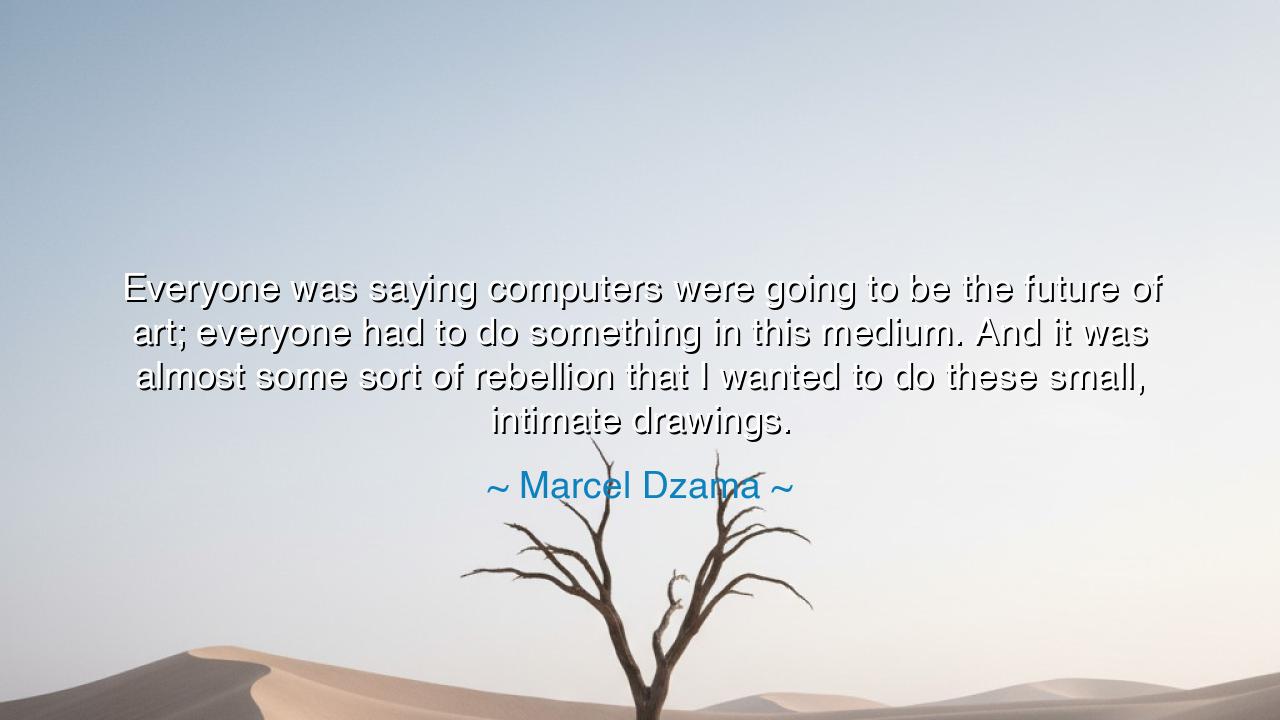
Everyone was saying computers were going to be the future of art;
Everyone was saying computers were going to be the future of art; everyone had to do something in this medium. And it was almost some sort of rebellion that I wanted to do these small, intimate drawings.






In the quiet yet defiant words of Marcel Dzama, we hear the voice of an artist who refused to bow to the tides of his age: “Everyone was saying computers were going to be the future of art; everyone had to do something in this medium. And it was almost some sort of rebellion that I wanted to do these small, intimate drawings.” These words, spoken in the era of machines and digital creation, are not merely about art—they are about authenticity, about the courage to remain human when the world rushes toward the mechanical. Dzama’s reflection is a whisper of resistance, a call to return to the touch of the hand, to the imperfection of ink and paper, to the soul that no algorithm can reproduce.
From the dawn of civilization, the artist has stood at the meeting point of progress and tradition. When the Greeks first carved in marble, some decried it as soulless compared to bronze. When the Renaissance masters painted with oil, others clung to fresco. In every age, new tools arise, promising greater speed and power—but the question remains: does greater ease bring greater truth? Dzama’s rebellion was not against technology itself, but against the notion that art must follow the machine to stay relevant. He chose instead the intimate, the slow, the personal—the quiet act of drawing by hand, which binds the artist’s heart to his work. In a world that worshipped the future, he turned inward, toward timelessness.
The origin of this quote lies in Dzama’s early career, during a time when digital art and computer-based media were hailed as the inevitable next step in creativity. The art world, enchanted by pixels and programs, saw the digital canvas as the frontier of innovation. Yet Dzama, standing amidst this wave, felt the pull of something older. With pen, watercolor, and paper, he built worlds that were fragile and strange, filled with creatures of imagination and melancholy. His defiance was not loud, but profound. For in choosing the small and the personal, he affirmed that art’s power lies not in its medium, but in its intention—in the touch of the soul upon matter.
Consider the story of William Morris, the craftsman and poet of the nineteenth century, who stood against the machine age of his own time. When the Industrial Revolution sought to replace beauty with production, he gathered artisans to create by hand once more—woven tapestries, carved furniture, printed books. His movement was a rebellion not of destruction, but of preservation: a defense of the human spirit in the face of automation. Just as Morris refused to let the machine define beauty, so Dzama refused to let the computer define creativity. Both understood a sacred truth: that art is not progress measured in tools, but presence measured in feeling.
Dzama’s words also reveal something universal about the nature of creation. The small and intimate are not lesser than the grand and technological—they are, in fact, the essence of truth. The hand-drawn line, imperfect and trembling, holds within it the trace of a living mind. A computer can imitate form, but not vulnerability; it can simulate style, but not sincerity. The ancients knew this when they painted upon cave walls, breathing life into their images with fire and pigment. Each stroke was a heartbeat. Dzama’s return to drawing, then, is a continuation of that lineage—a quiet echo of humanity stretching across millennia.
There is also a moral lesson in his rebellion. When the world declares that one path is inevitable, the wise soul pauses to ask: Is it right for me? Dzama’s choice reminds us that to create authentically is itself an act of courage. In any age, the crowd will point toward the future, but the artist listens to the present—the pulse of his own heart. True art, like true living, does not arise from compliance, but from conviction. His rebellion was not against technology, but against uniformity, against the dull sameness that comes when every artist bends to fashion.
Let this, then, be the teaching passed down: do not mistake innovation for meaning. The tools of creation may change, but the soul of creation does not. Whether you wield a brush or a stylus, a pen or a code, let your work be guided not by trend, but by truth. Honor what is intimate, for in the small gestures of sincerity lies the vastness of art. As Marcel Dzama shows us, sometimes the greatest rebellion is not to move faster into the future, but to stand still—to draw slowly, to feel deeply, to remember that the hand, not the machine, is still the truest mirror of the soul.
And so, O seeker of beauty, when the world tells you to follow the new, ask instead what feels real. For in that moment of quiet defiance, you will find not only your art, but yourself.






AAdministratorAdministrator
Welcome, honored guests. Please leave a comment, we will respond soon